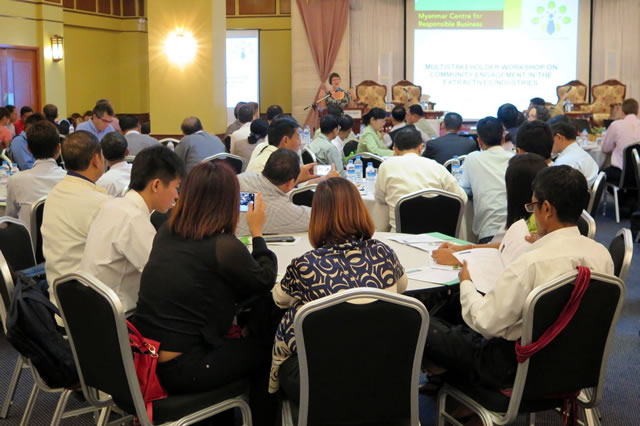Community Engagement by Extractive Companies is Essential for Success in Myanmar

The Myanmar Centre for Responsible Business (MCRB) held a “Multi-Stakeholder Workshop on Community Engagement in the Extractive Industries” in Yangon on 27/28 January 2015 to discuss international best practice in strategic community investment and engagement, including how to handle grievances. The workshop was attended by over 100 representatives from government departments, oil, gas and mining companies, civil society organisations from across Myanmar as well as international NGOs and donor organisations.
The workshop follows the publication in September 2014 of a sector-wide impact assessment (SWIA) of the oil and gas sector by MCRB. This looked at the impacts of oil and gas at the national/sectoral level and the project level, as well as potential cumulative impacts, and highlighted relevant international standards and best practice.
The objectives of the workshop were:-
-
to share experiences of community engagement in the extractive industries in Myanmar and elsewhere;
-
to identify the interests in community investments and complaint resolution of different stakeholders for the extractive industries, including government, communities and companies; and
-
to facilitate the creation of opportunities for co-operation and future dialogue on issues relating to community investment and wider engagement.
Vicky Bowman, Director of Myanmar Centre for Responsible Business said:
"MCRB held this workshop for two reasons. Firstly, our assessment found that engagement, information and genuine two-way communication by business with stakeholders, particularly local communities and national NGOs, has historically been almost completely absent in Myanmar, leading to mistrust, misunderstanding and occasionally conflict. This workshop is intended to give participants a chance to learn from good practice elsewhere, including about how to deal with complaints and grievances. It was also an opportunity to share experiences in Myanmar to date, and to hear company and civil society’s viewpoints. We hope that today’s meetings have started some dialogues that will continue for years".
"Secondly we want to highlight examples of how extractive companies nowadays work with local and national level stakeholders to ‘create shared value’ through strategic community investment rather than undertaking philanthropy’. They will look for opportunities to help communities to address their development priorities in a way which is sustainable and supports the objectives of the business. That might mean adapting construction plans for an access road so it also helps villagers get to the local market. It could be about offering ‘work-readiness’ classes so that local communities are more employable, or strengthening universities to train better geologists or marine biologists. The success of such strategic investments depends far less on the ‘how much’, than on the ‘how’".
Depending on interest, MCRB may host follow-up multistakeholder workshops to explore further issues related to responsible investment in the extractive industries in Myanmar, such as security and human rights. These workshops are intended as a complement to the multistakeholder dialogue on revenue transparency taking place as a result of Myanmar’s candidacy for the Extractive Industries Transparency Initiative.
Background
-
Myanmar Centre for Responsible Business (MCRB) is a Yangon-based initiative funded by the UK, Denmark, Norway, Switzerland, Netherlands and Ireland governments, based on a collaboration between the UK-based Institute for Human Rights and Business, and the Danish Institute for Human Rights. The Centre was established in 2013 to provide an effective and legitimate platform for the creation of knowledge, capacity and dialogue concerning responsible business in Myanmar, based on local needs and international standards, which results in more responsible business practices. It is a neutral platform working with businesses, civil society and government.
-
In addition to MCRB’s six core donors, this workshop was co-sponsored by the UK Foreign and Commonwealth Office’s Prosperity Fund.
-
A bilingual English/Myanmar executive summary of the Oil and Gas SWIA, and the full SWIA report (currently English language only) is available at https://www.myanmar-responsiblebusiness.org/news/swia/
-
The SWIA is based on both desk-based and field-based research in six locations throughout the country which have already experienced O&G related investment. It includes an in-depth analysis of existing Myanmar legal frameworks as well as the challenging historical, political and economic contexts O&G companies and business partners will have to manage.
-
The SWIA highlights relevant international standards of responsible business conduct, particularly from the United Nations (UN), the International Finance Corporation (IFC) and the Organisation for Economic Cooperation and Development (OECD) and draws on guidance from leading industry groups such as IPIECA. It makes recommendations on how these standards can be incorporated into policy-making and practice.
-
See also Spectrum’s press release of 28 January 2015 launching the Myanmar language translation of ‘Why Cultural Heritage Matters’, a resource guide for integrating cultural heritage management into communities work produced by mining company Rio Tinto.
Read also
- Rakhine State and Kyaukphyu Communities Want Companies and Government to Coordinate and Consult With Them on Community Development Programmes
- MCRB submits comments on draft Petroleum Bill
- MCRB Submits Comments to the Hluttaw on the Bill concerning Artisanal Oil Production
- Building an Effective EIA Process for Offshore Oil and Gas Operations
- Note of a Meeting on Environmental & Social Standards in the Myanmar Oil and Gas Sector
 English
English မြန်မာ
မြန်မာ မြန်မာ (unicode)
မြန်မာ (unicode)








